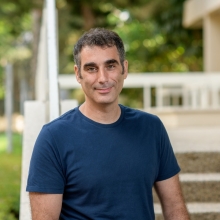Introducing Dr. Leeat Keren
Elucidating cancer in its environment
New scientists

Cancer researchers are just beginning to unravel the interplay between the individual cells of a tumor, the immune system, and the “normal” cells that surround tumors, which comprise what’s known as their microenvironment. The immune system can attack growing tumors—or be fooled into ignoring them—allowing healthy cells to provide a supportive environment for the tumor.
Dr. Leeat Keren has helped develop some revolutionary new scientific tools to explore the full extent of the mechanisms that tumor cells use to take over their microenvironment and avoid the immune system’s scrutiny. Dr. Keren recently joined the Weizmann Institute after a four-year postdoctoral fellowship at Stanford University, where she was a Clore Fellow in the Israel National Postdoctoral Award Program for Advancing Women in Science, and also was a beneficiary of Rothschild Foundation, Fulbright, and Damon Runyon postdoctoral fellowships.
As a postdoc, she helped developed a new form of imaging technology combined with mass spectrometry, called multiplexed-ion-beam imaging by time-of-flight (MIBI-TOF). With it, she and her colleagues have been able to view, in an unprecedented way, the precise amount and location of dozens of different proteins at work in each cell in clinical specimens. It’s the photographic equivalent of bringing a blurry, black-and-white picture from a bygone age into full color and exquisite resolution. But even better, because this isn’t just for seeing pleasure; it could help save lives.
Implications for a lethal breast cancer, and melanoma
During her postdoc, Dr. Keren applied these tools to investigate the tumor microenvironment in triple-negative breast cancer—one of the most aggressive and deadliest, because of the lack of effective treatment—and identified patterns of interaction between the tumor and immune cells along the edges of the tumor that helped them predict a patient’s prognosis for survival. They suspect that these patterns represent cases in which the immune system manages to mount a successful response against the tumor. Now, at her new lab at the Department of Molecular Cell Biology, she is applying the same approaches to study melanoma, which has evidenced promise for treatment with immunotherapies.
“My father-in-law passed away from melanoma many years ago, and so this disease has a special interest for me and my family,” she says.
In a clinical collaboration between her Weizmann lab and the Dana Farber Cancer Institute in Boston, Dr. Keren and her team will be investigating changes in the tumor microenvironment in patients undergoing immunotherapy for melanoma, looking for clues about why individuals respond better or worse.
The main cause of death in melanoma patients is widespread metastases. So in another clinical collaboration with Hadassah Medical Center in Israel, Dr. Keren and her group will compare the immune microenvironment between primary melanoma tumors and the disease that has metastasized to the lymph nodes. “We want to understand what parts of the immune response happen at the primary site compared to the metastasized tissues,” she says. “Our main question is: Does melanoma use the same strategies to evade the immune system wherever it goes in the body? Or does it develop new tricks that allow it to metastasize?”
Her team will also map the mechanisms underlying these interactions, using the MIBI-TOF platform, in collaboration with the lab of her departmental colleague, Prof. Yardena Samuels, and her team. The Samuels lab, renowned for its breakthroughs in the understanding of melanoma, has developed a mouse model for the disease that enables scientists to control the composition of the tumor. This effort will elucidate why some melanoma tumors are attacked by the immune system, and others are ignored.
Dr. Keren received her undergraduate degree in life sciences from Tel Aviv University, a masters in the lab of Prof. Eran Segal at the Weizmann Institute, and her doctorate—which focused on systems biology—under the guidance of Prof. Segal (in the Department of Computer Science and Mathematics and the Department of Molecular Cell Biology) and Prof. Ron Milo in the Department of Plant and Environmental Sciences. Her honors include a Dean’s list scholar and Wolf Prize winner from Tel Aviv University; the Dean’s Prize for outstanding MSc students at the Weizmann Institute; and the Azrieli Center for Systems Biology prize for student-initiated project. She was recently awarded an Azrieli Foundation early-career faculty fellowship and a Horizon 2020 starting grant from the European Union.
Dr. Keren and her husband have three boys. They arrived in Israel in the midst of the coronavirus pandemic. “After not seeing family and friends for a long time, we basically waved hello and went into quarantine,” she says. “But this pandemic emphasizes the importance of biomedical research. I’m excited for our future in Rehovot and advancing my research at Weizmann”.
Dr. Keren is supported by the Enoch Foundation Research Fund, and the European Reseach Council. She is the incumbent of the Fred and Andrea Fallek President's Development Chair.








